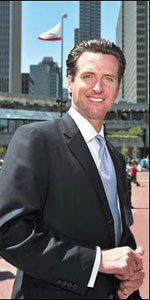Une pré-démarche de veille consiste à déterminer, une fois le sujet défini et arrêté, les contours de la veille qui va être effectuée sur le sujet. Cette première ou pré-étape permettra ensuite d'utiliser les outils de façon réfléchie et efficace.
Il s'agit donc de définir la géographie de la veille, les points d'accès (ou acteurs en présences) par lesquels l'information sera accessible, puis les mots clés qui seront utilisés pour trouver les informations.
Géographie de la veille :L’initiative du ChinaSF est extrêmement récente, puisqu’elle a été seulement mise en place en Novembre 2008. Son nom a même changé entre les premières informations communiquées à ce sujet et l’inauguration du bureau. De ChinaDesk, le nom est devenu ChinaSF. Si, en conséquence, les acteurs de cette initiative ne vont se dégager qu’au fil de la veille, le sujet est déjà très attractif et bénéficie donc d’une certaine visibilité en ligne.
Par définition, le partenariat public-privé qu’est le ChinaSF recouvre une ère géographique relativement précise.
D’un côté, le bureau China SF est implanté à San Francisco et a pour but de développer l’implantation des entreprises et l’investissement chinois. La zone concernée sur le territoire américain est donc en priorité San Francisco et sa métropole au sens large, la Baie (Bay Area). Pour pouvoir mettre les différents éléments trouvés en perspective, la veille s’attachera à suivre également, de temps à autres, les relations économiques entre les U.S et la Chiine.
De l’autre côté de l’océan, la Chine entière est ciblée. Cependant, le choix de Shanghai comme ville d’accueil du bureau ChinaSF en Chine semble indiquer que les efforts se concentreront davantage sur cette zone de la Chine.
Acteurs en présence :
Une recherche superficielle sur google avait mis en évidence des points d’accès initiaux (acteurs) tels que les chambres de commerce (Chambre de Commerce de San Francisco, Chambre de Commerce de Californie, les Chambres de Commerce Sino-Americaine en Californie), le consulat de Chine à San Francisco, des associations et organisations à but non lucratifs (Asia Foundation, Asia Society, etc) et le Office of Economic and Workforce Development, organisme duquel dépend le ChinaSF et des points d’informations comme les journaux économiques ayant une version locale, ainsi que les actualités des différentes chambres de Commerce.
Grâce aux outils de cartographies (Kartoo et Mooter en particulier), d’autres acteurs, tout aussi pertinents ont pu être mis en évidence, comme :
- the Bay Area Council (contacts : Melanie Paulos, Jim Wunderman)
- the Bay Area Economic Institute (directeur San Randolph)
- the Comittee of 100
Une fois ces deux étapes effectuées, il a fallu déterminer les mots-clés avec lesquels travailler par la suite, nécessaires pour une démarche de recherche structurée.
Recherche de mots-clés:
Le but est que ces mots soient aussi pertinents, problématisés que possible, ou du moins suffisamment précis pour obtenir des informations ciblées, sans pour autant être trop restrictifs.
Etant donné la géographie du sujet, la recherche de mots-clés s'est effectuée en anglais principalement, par anticipation de sources qui seraient en anglais majoritairement.
La lecture du guide d'utilisation des opérateurs boléens de Google a permis d'affiner les mots-clés utilisés, (et donc les résultats trouvés) tout particulièrement le signe "+", les guillemets et le "~", qui permet de faire des recherches englobants tous les mots synonymes à celui sur lequel cet opérateur boléen s'applique. Par ailleurs, le NEAR dans d’autres outils (DevonAgent par exemple) se révèle très utile.
Les premiers mots-clés choisis ont été les suivants :
China Desk / China Desk San Francisco / China Desk + San Francisco
Relations économiques San Francisco Shanghai
Relations économiques US-Chine
Relations économiques San Francisco Chine
San Francisco China economic ties
California China economic ties
California China economic relations
Chinese Business in California
US China ties
Ces premiers mots clés étaient assez larges et vastes afin de voir s’il existait des infos les comportant. Les résultats furent cependant mitigés et souvent majoritairement peu pertinents. Très vite, certains mots-clés se sont révélés plus utiles que d'autres, et certains ont été abandonnés, d'autres ajoutés.
Plusieurs problèmes se sont ainsi posés pour certains mots clés : par exemple beaucoup de résultats en rapport avec le mobilier de bureau (en raison du mot desk), même avec des guillemets ; et des résultats en rapport avec le tourisme (en raison de la combinaison San Francisco/Shanghai) qui viennent souvent polluer les résultats. De plus, US-China ties donnaient beaucoup trop de résultats, ce qui rendait impossible de retrouver des informations intéressantes.
Après utilisation d’outils (cf Partie III), les mots clés ont été revus.
Les outils cartographiques comme Kartoo sont réputés pour aider à la détermination de nouveaux mots clés. De fait, c’est davantage en cliquant sur les liens proposés qu’à la simple vue des cartes que de nouvelles idées de mots clés sont apparues. Ainsi, il est apparu utile :
- d’élargir les notions recherchées : Bay Area, San Francisco Bay Area ; the Bay Area région, SF Bay area plutôt que simplement San Francisco;
- d’inclure des synonymes : economic {business ; trade ; commerce ; investment ; exchange} ; ties {relations, links, connection, connections} ; Business {companies ; firms ; venture ; joint venture ; corporation headquarters…}
- et d’ajouter des mots : Gateway (« Bay Area Gateway to China/Asia » Bay Area + Gateway to China ) ; Portal (« Bay Area Portal for US China exchange »)
Etant donné l’importance des synonymes qui peuvent être utilisés de façon relativement interchangeable, pour qualifier le sujet l’emploi d’opérateurs tels que « ~ » dans google et le NEAR dans d’autres outils (DevonAgent par exemple) se révèle très utile.
A partir de ces mots clés, une veille a été mise en place.






